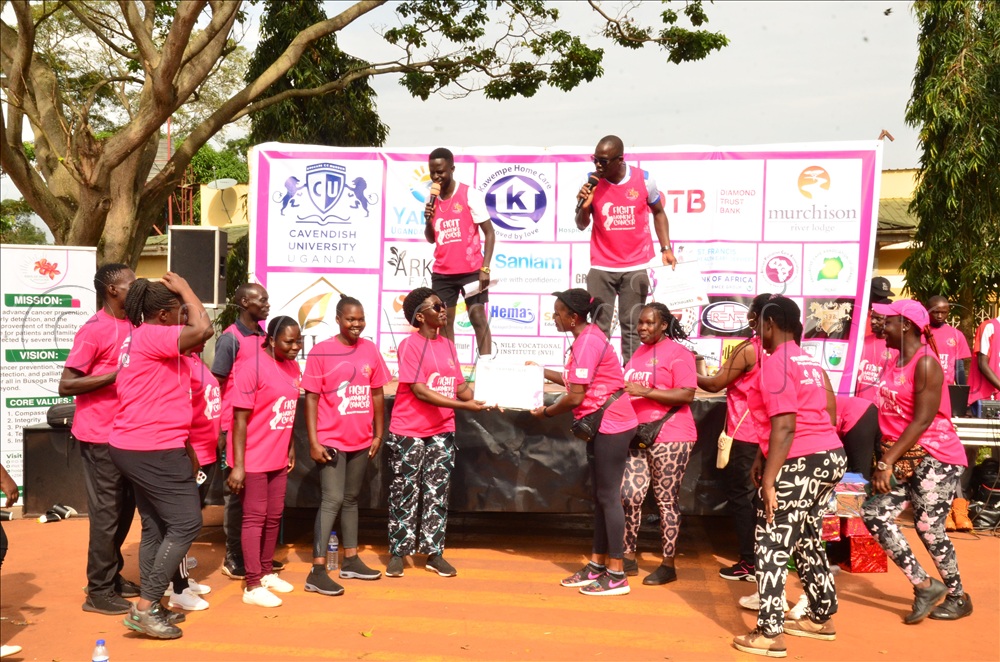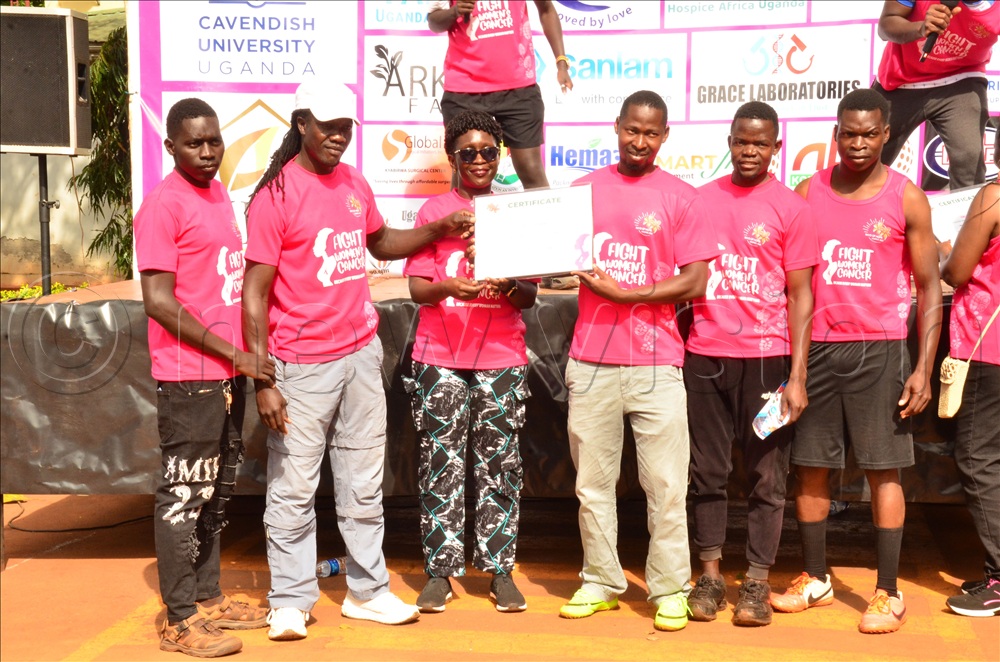Public urged to embrace cancer screening as Jinja holds awareness run
Cervical cancer is the most common disease among women in Uganda and the leading cause of cancer-related deaths among women, with approximately 6,959 new cases and 4,607 deaths annually as of 2020.
Fight women Cancers participants walking through the streets of Jinja City led by a brass band. (Photos by Agnes Kyotalengerire)
________________
Every year, over 3,000 Ugandan women are diagnosed with breast cancer and approximately 6,959 with cervical cancer. Sadly, more than 50% of them succumb to the disease because they are diagnosed late.
Clad in a pink T-shirt, with beads of sweat rolling down her face, Sarah Acen struggles to keep pace with the Iganga Community Brass Band Music School.
Acen, who works with Nilus Group Limited in Jinja, is not just having fun but rather walking for a cause.
In our interaction later, Acen reveals that years back, her maternal aunt was diagnosed with cervical cancer in an advanced stage (stage 4) at Lacor Hospital in Gulu city. The sick aunt was immediately started on treatment, but sadly succumbed to the disease.
It did not take long before Acen’s mother developed breast cancer, which was diagnosed early. She was immediately started on treatment and responded well. Today, Acen’s mother is recovering.
Acen was among hundreds of people who on October 25, 2025, joined the Fight Women’s Cancer Run under the theme: “Because Every Woman Matters” at the Health First Gym and Fitness Centre in Jinja city.
The event, which kicked off at 6:00 am, attracted close to 800 participants who took part in a 5-kilometre walk, 10-kilometre run and 15-kilometre ride, flooding the entire Jinja city.
It was the culmination of a one-month campaign against cervical and breast cancer, aimed at creating awareness about the fatal disease.
Officer in charge of palliative care at Ministry of Health Dr Miriam Ajambo handing over a certificate of appreciation to participants of the Fight Women Cancer run.
The seventh run was organised by Rays of Hope Hospice Jinja in partnership with Cavendish University, Hospice Africa Uganda, Kawempe Home Care, Nilus Company Limited, Yalelo, Sanlam, Diamond Trust Bank and Murchison River Lodge.
The executive director of Rays of Hope Hospice Jinja, Sylvia Nakami, said the Fight Women’s Cancer Initiative was established to create awareness and provide screening services in the Busoga sub-region.
Nakami said that previously, many women were dying of cervical and breast cancer because they were seeking treatment when the disease had already progressed to a late stage.
“About 73 percent of all the ladies with cancer on our programme had cervical and breast cancer. Yet they were coming late to seek treatment, which means the chance for survival after treatment was very minimal,” she said.
Nakami attributed this to limited knowledge about the disease.
“People do not know about the disease, and so they keep quiet and come only to the health facilities after they have developed complications,” she noted.
In response, the agency embarked on creating awareness, encouraging people to learn about cancer and get checked to enable early detection.
In addition, screening services were not readily available, especially in rural areas. Data from the Uganda Cancer Institute shows that only 5 percent of sexually active women in Uganda have had their cervix checked for cancer, and only 7 percent have been examined for breast cancer.
“That is a very small percentage compared to the ladies who are at high risk of the disease,” Nakami said.

The officer in charge of palliative care at the Ministry of Health, Dr Miriam Ajambo, said it is encouraging to see the public joining efforts to fight non-communicable diseases, particularly cancer, which is on the rise.
“I am glad that today we have walked, run and done a lot of gymnastics,” she said.
Dr Ajambo further noted that health facilities are overwhelmed by the huge number of patients being diagnosed with cancer of the cervix and breast, which are the leading causes of death among women of reproductive age.
“This is very disheartening, and yet we know that if we created awareness, we would save very many,” she said.
Dr Ajambo said the solution to late diagnosis lies in creating awareness, helping the public understand cancer, how to perform breast self-examinations, and seeking further medical investigations when necessary.
The deputy prime minister of Busoga kingdom, Osman Ahmed Noor, faulted people who are not embracing screening services despite cancer affecting everyone, irrespective of age.
Noor, who was the chief walker, said the battle against cancer should not be relegated to the health sector alone, but should be a shared responsibility.
He urged traditional leaders, religious institutions, schools, local governments and every citizen to embrace cancer screening.
“Let us speak openly about cancer and encourage women to get screened.”
The capacity building manager at the Palliative Care Association of Uganda (PCAU), Joyce Zalwango, agreed. Zalwango said women’s cancers, such as cervical and breast cancer, can be prevented when routine screening and health education are prioritised.
“Activities such as the cancer runs empower the community to take responsibility for their lives and prevent diseases,” she noted.
The cancer burden
Cervical cancer is the most common disease among women in Uganda and the leading cause of cancer-related deaths among women, with approximately 6,959 new cases and 4,607 deaths annually as of 2020.
Cervical cancer is a disease that starts in the cells of the cervix, the lower part of the uterus, and is caused by a persistent infection with certain types of human papillomavirus (HPV).
Breast cancer is an abnormal growth of cells that form a tumour and can spread to other parts of the body. 21